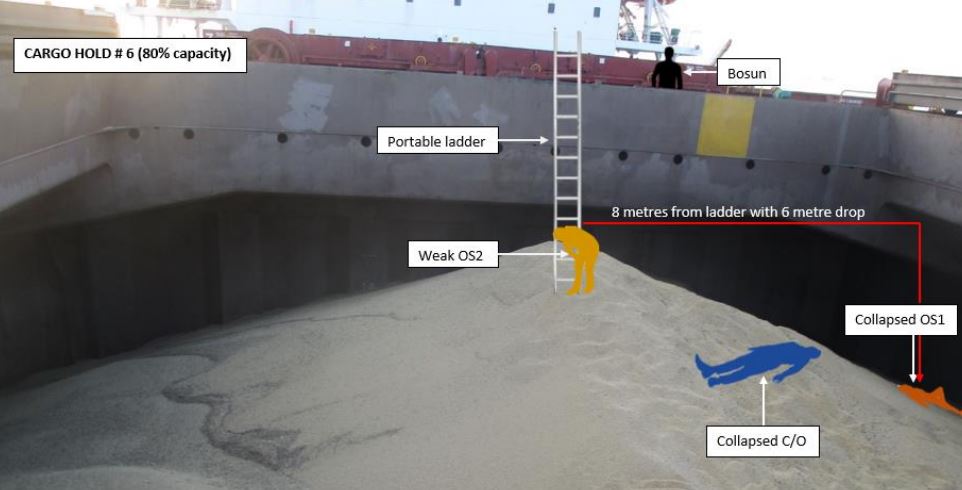Safety Alert: fumigant poisoning fatality on board a bulk carrier
17 May 2022, bulk carrier Jupiter was at anchor. An ordinary seafarer collapsed while carrying out a routine pre-discharge check on the condition of a soya bean cargo in the hold. Another crew member attempted to help and also collapsed. Both were recovered from the hold by a team wearing breathing apparatus and transferred to hospital ashore. The initial casualty did not survive. The second crew member was hospitalised for 13 days but made a full recovery.
The seafarer died as a result of exposure to lethal levels of phosphine gas.
The cargo had been fumigated at the load port. The holds were not considered dangerous because the vessel had a gas free certificate, issued by fumigant removal contractors, and the hatches had been open and ventilated for some time. The false perception of safety was re-enforced as entry into the other holds had occurred without incident the previous days. There was no effective hazard identification so work commenced as planned. The space was not retested prior to crew entering to inspect the cargo for wet spots.
The report concludes that fumigated cargoes are ‘incredibly dangerous’ and that cargo holds that contain fumigated cargo should not be entered. Lethal doses of fumigant may remain in pockets or trapped within the cargo. A gas free certificate does not guarantee safety; therefore precautions should always be taken to mitigate the risk and likelihood of gas poisoning.
For the full alert:
Other incidents involving fumigation:
There are several incident reports on public record involving fumigation and fumigants, indicating the critical importance of managing respiratory and toxic risk. Examples include:
- Report on cargo fumigant poisoning leading to a fatality on Fri Dolphin, 13 February 2020 https://www.bahamasmaritime.com/wp-content/uploads/2020/11/BMA-Investigation-Report-Fri-Dolphin-Fumigation-Poisoning.pdf?swcfpc=1
- Phosphine poisoning on general cargo vessel Monika with loss of 1 life https://www.gov.uk/maib-reports/phosphine-poisoning-on-general-cargo-vessel-monika-with-loss-of-1-life
- Release of phosphine gas during discharge of fumigated maize cargo from general cargo vessel Arklow Meadow https://www.gov.uk/maib-reports/release-of-phosphine-gas-during-discharge-of-fumigated-maize-cargo-from-general-cargo-vessel-arklow-meadow-at-warrenpoint-northern-ireland
- Acute phosphine poisoning on board a bulk carrier: analysis of factors leading to a fatal case https://occup-med.biomedcentral.com/articles/10.1186/s12995-015-0050-0
- Mass Occupational Phosphine Poisoning of a Dry-Cargo Ship Crew: A Case Report https://pubmed.ncbi.nlm.nih.gov/36447969/#:~:text=On%20October%2018%2C%202018%2C%20the,poisoning%20and%20evacuated%20them%20onshore
Information on phosphine:
- Phosphine: general information: https://assets.publishing.service.gov.uk/government/uploads/system/uploads/attachment_data/file/659910/phosphine_general_information.pdf
- Phosphine incident management: https://assets.publishing.service.gov.uk/government/uploads/system/uploads/attachment_data/file/768015/Phosphine_IM.pdf
- Phosphine toxicological overview: https://assets.publishing.service.gov.uk/government/uploads/system/uploads/attachment_data/file/338253/HPA_Phosphine_toxicological_overview_v1.pdf
International codes:
- IMO Circular MSC.1/Circular.1264 – Recommendations on the Safe Use of Pesticides in Ships Applicable to the Fumigation of Cargo Holds, which details the safe use of fumigants, measurement of fumigant levels on board ships and the responsibility to notify port authorities of the potential presence of fumigants on board.
- International Maritime Solid Bulk Cargoes (IMSBC) Code https://www.imo.org/en/OurWork/Safety/Pages/CargoesInBulk-default.aspx
- The International Maritime Dangerous Goods (IMDG) Code https://www.imo.org/en/OurWork/Safety/Pages/DangerousGoods-default.aspx
ICHCA International is committed to helping industry to learn lessons fast, learn them once and make sure that they stay learnt. This information is intended to provide all organisations in the cargo supply chain with the opportunity to consider the events and to review and adapt their own health and safety control measures to proactively prevent future incidents.
We are grateful to The Bahamas Maritime Authority for providing details. We acknowledge their commitment to sharing learning to benefit others. If you have similar operations, please share this information with managers, operatives and any potentially affected third parties as appropriate. Please also review any of your relevant operations for similar hazardous conditions, risks, and controls. Learning content like this is highly valuable as it is based on real-world experience. We encourage everyone with publishable information about incidents to send it to us, so that we can raise awareness across the whole industry. Please contact us at secretariat@ichca.com; sharing your insight could save a life or prevent injury.

